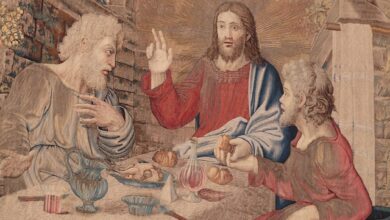Take And Eat Sustenance For The Journey Else It Will Be Too Difficult

The readings for the 19th Sunday in Ordinary Time, Year B, are a powerful reminder of the necessity of spiritual sustenance in our lives, particularly through the Eucharist. These scriptures invite us to reflect deeply on our own spiritual journey and the means by which we are sustained along the way.
In the first reading from 1 Kings 19:4-8, we encounter the prophet Elijah at a moment of deep despair. Weary and disheartened, Elijah retreats into the wilderness, ready to give up. But in this moment of profound weakness, God intervenes. He sends an angel to Elijah, who tells him, “Get up and eat, else the journey will be too long for you.” This simple yet profound act of divine provision—a hearth cake and a jar of water—gives Elijah the strength to continue his journey for forty days and forty nights.
This story is not just about Elijah’s physical journey but a powerful metaphor for our spiritual journey. Just as Elijah needed physical nourishment to continue on his path, we need spiritual nourishment to sustain us on our journey through life. Without it, the trials and challenges we face can become overwhelming, leading us to despair and hopelessness.
The responsorial psalm, Psalm 34, reinforces this theme with the invitation to “taste and see the goodness of the Lord.” The psalmist reminds us that those who seek the Lord lack no good thing and that God delivers those who are brokenhearted and crushed in spirit. It is a call to trust in God’s providence and to rely on Him for our sustenance.
In the second reading from Ephesians 4:30—5:2, St. Paul exhorts the Christian community to live in love, imitating God by being kind, compassionate, and forgiving. This call to live in love is a reflection of the sustenance we receive from God. Just as God sustains us, we are called to sustain one another through acts of love, kindness, and forgiveness.
The Gospel reading from John 6:41-51 is the climax of this theme of sustenance. Jesus reveals Himself as the “bread that came down from heaven.” He declares that those who eat this bread will live forever, drawing a direct connection between the physical bread He provided to the Israelites in the desert and the spiritual bread He now offers in the Eucharist. Jesus’s words are clear: “Unless you eat the flesh of the Son of Man and drink his blood, you do not have life within you.”
This passage underscores the central role of the Eucharist in the life of a Christian. The Eucharist is not merely a symbol but the real presence of Christ, who gives Himself to us as food for our journey. Without this spiritual nourishment, we cannot make it through the trials and temptations of life. In a world filled with negativity, division, and sin, the Eucharist is our anchor, our strength, and our hope.
This reflection leads us to a crucial realization: sin is our greatest enemy on this journey from life to eternal life. The angel’s words to Elijah—“Get up and eat, else the journey will be too long for you”—resonate deeply when we consider our own struggles with sin. Without the sustenance of the Eucharist, we are vulnerable to the temptations and distractions of the world. But with Christ as our nourishment, we have the strength to overcome sin and to remain focused on our ultimate goal—union with God in eternal life.
Brothers and sisters, the Eucharist is the ultimate remedy for sin and death in our lives. It is the continuation of Christ’s sacrifice on the cross, offered to us over and over again in the form of His body and blood. It is through the Eucharist that we are united with Christ, that we receive the grace to conquer sin, and that we are sustained on our journey to eternal life.
As we reflect on these readings, let us recommit ourselves to receiving the Eucharist with greater reverence and awareness of its significance. Let us recognize that without this spiritual sustenance, we cannot hope to make the journey to eternal life. And let us always remember that in the Eucharist, we receive the very life of Christ, who strengthens us, sustains us, and leads us to the fullness of life with God.






